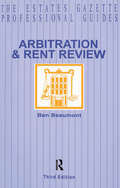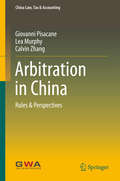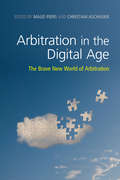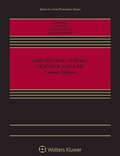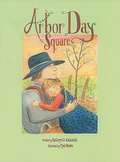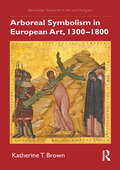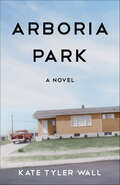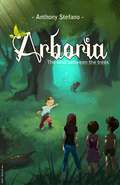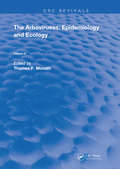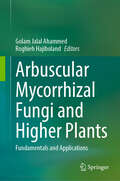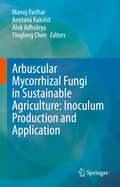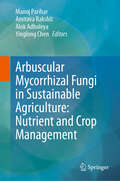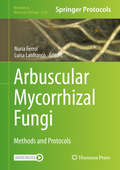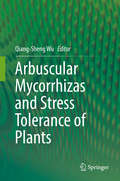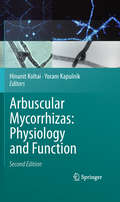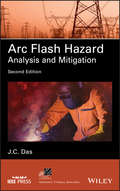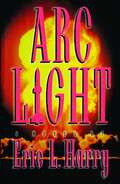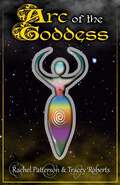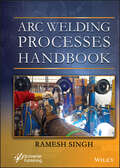- Table View
- List View
Arbitration and Rent Review
by Ben BeaumontArbitration and Rent Review has become a standard work in the property world for guidance on rent review. In a clear style, the author examines the procedures that landlord and tenant should follow in order to agree a new rent or to have one decided by arbitration. By means of cases, he highlights the key areas of conflict that come before the courts, the contentious issues being introduced in the order in which they would be encountered by landlords or tenancts facing a review.
Arbitration and the Constitution
by Peter B. RutledgeArbitration has become an increasingly important mechanism for dispute resolution, both in the domestic and international setting. Despite its importance as a form of state-sanctioned dispute resolution, it has largely remained outside the spotlight of constitutional law. This landmark work represents one of the first attempts to synthesize the fields of arbitration law and constitutional law. Drawing on the author's extensive experience as a scholar in arbitration law who has lectured and studied around the world, the book offers unique insights into how arbitration law implicates issues such as separation of powers, federalism, and individual liberties.
Arbitration in China: Rules & Perspectives (China Law, Tax & Accounting)
by Giovanni Pisacane Lea Murphy Calvin ZhangThe book provides a comprehensive and practical overview of arbitration in the People's Republic of China. The process of arbitrating a dispute is described from the perspective of a non-Chinese individual or business. Readers are guided through the typical course of events in an arbitration process. By avoiding both excessive technicality and undue simplification, the book appeals to both law professionals and business managers, and is useful for practitioners and non-experts alike. Recent developments in Chinese law on the matter, up to the first quarter of 2015, has been taken into account in order to provide readers with a pragmatic, up-to-date presentation of the topic. For the same reasons, illustrative reference is made to the Shanghai FTZ Arbitration Rules. The relevant provisions are noted throughout the text; the three appendices at the end of the book allow for easy referencing of the main legislation and regulations. The appendices include English versions of the most important PRC Statutes and Interpretations of Statutes on arbitration, the Arbitration Rules of the main Chinese arbitration institutions and the official Model Arbitration Clauses suggested by those institutions.
Arbitration in the Digital Age: The Brave New World of Arbitration
by Maud Piers Christian AschauerArbitration in the Digital Age analyses how technology can be efficiently and legitimately used to further sound arbitration proceedings. The contributions, from a variety of arbitration scholars, report on current developments, predict future trends, and assesses their impact from a practical, legal, and technical point of view. The book also discusses the relationship between arbitration and the Internet and analyses how social media can affect arbitrators and counsel's behaviour. Furthermore, it analyses the validity of electronic arbitration and awards, as well as Online Arbitration (OArb). The volume establishes, on a very practical level, how technology could be used by arbitration institutions, arbitrators, parties to an arbitration and counsel. This book will be of special interest to arbitrators and lawyers involved in international commercial arbitration.
Arbitration: Theory, Practice and Law
by Jay Folberg Dwight Golann Thomas J. Stipanowich Lisa A. KloppenbergThis custom title contains selections from: <p><p> Resolving Disputes: Theory, Practice, and Law, Third Edition (9781454838746); Jay Folberg, Dwight Golann, Thomas J. Stipanowich, Lisa A. Kloppenberg
Arbor Day Square
by Cyd Moore Kathryn Osebold GalbraithA heartfelt story about community and family, and how neighbors working together can make their town a better place for themselves and future generations. Katie and her papa are among a group of settlers building a town in the middle of the dusty, brown prairie. Every week the trains bring more people and more lumber to build houses, fences, and barns. New buildings are erected: a church with a steeple, a store with glass windows, even a schoolhouse with desks for seventeen children. But one thing is missing: trees. When the townspeople take up a collection to order trees from back east, Katie adds her own pennies and Papa's silver dollar. When the tiny saplings finally arrive, Katie helps dig holes and fetch water. Then, in a quiet corner off the public square, Katie and Papa plant a flowering dogwood in memory of Mama. Although set in the past, Kathryn O. Galbraith's gentle story of community building, the timelessness of love, and the power of ritual will resonate with young readers today. Cyd Moore's full-color illustrations reflect the simplicity of the story and life in a new prairie town, while evoking the complexity of its themes.
Arboreal Symbolism in European Art, 1300–1800 (Routledge Research in Art and Religion)
by Katherine T. BrownArboreal Symbolism in European Art, 1300–1800 probes the significance of trees in religious iconography of Western art.Based in the disciplines of art history, botany, and theology, this study focuses on selected works of art in which tree forms embody and reflect Christian themes. Through this triple lens, Brown examines trees that early modern artists rendered as sacred symbols—symbols with origins in the Old Testament, New Testament, Greek and Roman cultures, and early medieval legends. Tree components and wood depicted in works of art can serve as evidence for early modern artists’ embrace of biblical metaphor, classical sources, and devotional connotations. The author considers how artists rendered seasonal change in Christian narratives to emphasize themes of spiritual transformation. Brown argues that many artists and their patrons drew parallels between the life cycle of a tree and events in the Gospels with their respective annual, liturgical celebrations.This book will interest scholars in art history, religion, humanities, and interdisciplinary studies.
Arboria Park: A Novel
by Kate Tyler WallStacy Halloran has lived most of her life in 1950s-era housing development Arboria Park. But her beloved neighborhood may not survive much longer. Despite her parents’ entreaties to “stay in the yard where it’s safe,” the Park is where young Stacy roams in quest of “real life.” Through her wanderings, she learns about the area’s agricultural history; meets people from backgrounds different than her own; watches her siblings develop interracial and same-sex relationships; helps launch the local punk-rock scene; and finally, settles as a wife and mother. As the neighborhood declines (along with her relationship with her mother), Stacy considers moving on to rescue herself and her daughter. But then a massive highway project threatens the ever-resilient Park—and it’s Stacy’s task to rally family, friends, and neighbors to save it.
Arboria: The Land Between the Trees
by Anthony StefanoSomething is afoot in Durbuy, the smallest town in the world. Alexander, Hope, Meredith and Amy are spending a wonderful time on holiday with their parents in a house at the edge of a forest when, quite by accident, they stumble across a gateway into a fantastic land populated by dwarfs, gnomes and a host of other creatures each stranger than the last. But they are not the only ones looking for a way back to their own world; a mysterious Sorceress has been trying to locate the portal for the last several centuries...
Arborite
by Anita M. McgahanDescribes the competitive position of Arborite, a Canadian manufacturer of high-pressure laminates (HPL) (a product sold under the Formica name in the United States). Arborite's market share has slipped, and a new general manager must evaluate whether a change in strategy is warranted. Provides detailed information for Arborite and its competitors on the costs of performing the activities necessary to manufacture and market HPL.
Arboviruses: Epidemiology and Ecology (Routledge Revivals #3)
by Thomas P. MonathFirst Published in 1988, this five volume set documents the transmission and growth of Arthropod born viruses. Carefully compiled and filled with a vast repertoire of notes, diagrams, and references this book serves as a useful reference for Students of Epidemiology, and other practitioners in their respective fields.
Arbuscular Mycorrhizal Fungi and Higher Plants: Fundamentals and Applications
by Golam Jalal Ahammed Roghieh HajibolandThis book covers the fundamentals of arbuscular mycorrhizal fungi (AMF) and higher plant symbiosis with potential implications in crop production. It provides new insights into our understanding of the mechanisms of AMF-mediated plant growth regulation and stress tolerance covering the most recent biochemical, physiological, molecular, environmental, and ecological studies. Focusing on AMF-induced physiological and molecular mechanisms of enhanced tolerance to stress, environmental stress is discussed in several dedicated chapters. The book provides not only updated information with new insights and perspectives but also several new topics, such as a comprehensive discussion on biotic stressors, AMF interaction with other microorganisms, non-host plant species, plant secondary metabolism, signaling events in plant-AMF symbiosis, AMF-mediated nutrient acquisition and subsequent stress tolerance. The book also discusses the potential implications of AMF for sustainable crop production in the context of climate change. The book can be a useful reference book for academics and scientists involved in related research, such as academics in agronomy and plant sciences, scientists involved in beneficial fungi research, chemists, industrialists, and employees involved in the production and marketing of biofertilizers, master and doctoral degree students of agronomy, horticulture, and plant protection, consultants working on the production of crops in marginal environments as well as environmental scientists working for assisted phytoremediation programs. It would also be suitable for agronomy, ecology, and plant science-related courses, such as plant stress physiology, plant growth-promoting microbes, and plant pathology to teach undergraduate, graduate, and postgraduate students at colleges and universities.
Arbuscular Mycorrhizal Fungi in Sustainable Agriculture: Inoculum Production and Application
by Amitava Rakshit Manoj Parihar Alok Adholeya Yinglong ChenThis 2-volume book is an up-to-date overview of current progress in Arbuscular Mycorrhizal Fungal (AMF) technique development, inoculum production and its quality regulations, application in agriculture, horticulture, agroforestry, and other ecosystems, along with nutrient management for sustainable food production. It contains the current advancement in basic and molecular techniques, challenges, opportunities, and determinates of various AMF production methods and major tools and techniques for their field application. Production and development of AMF is rapidly evolving and requires a multidisciplinary approach with up-to-date knowledge to broaden and strengthen the perspective of researchers involved in this domain. The volumes offer new insight and cutting-edge information for novices and experts such as students, academicians, researchers, environmentalists, industrialists, and others interested in mycorrhiza. The first volume covers some basic isolation techniques, enumeration,and molecular studies with recent advances in various in-vitro and in-vivo production technologies, regulatory issues, and application methodologies for field inoculation. It also discusses AMF application in various agroecosystems for sustainable agricultural production and a healthier planet.
Arbuscular Mycorrhizal Fungi in Sustainable Agriculture: Nutrient and Crop Management
by Amitava Rakshit Manoj Parihar Alok Adholeya Yinglong ChenThis 2 volume book is an up-to-date overview of current progress in Arbuscular Mycorrhizal Fungal (AMF) technique development, inoculum production and its quality regulations, application in agriculture, horticulture, agroforestry and other ecosystems along with nutrient management for sustainable food production. It offers new insight and cutting-edge information for novices and experts such as students, academicians, researchers, environmentalists, industrialists, and other individuals interested in the field of mycorrhiza.AMF provides favorable rhizospheric environment to the plant with numerous direct and indirect mechanisms, in exchange of soil nutrients and photosynthetically fixed carbon. Other than the species composition and diversity determination of natural ecosystem, AMF play a vital role in maintaining the soil quality, agricultural sustainability and environmental integrity. The second volume provide comprehensive knowledge on AMF role in nutrient cycling, nutrient exchange and their acquisition under normal and stress condition.
Arbuscular Mycorrhizal Fungi: For Nutrient, Abiotic and Biotic Stress Management in Rice
by Periyasamy PanneerselvamArbuscular mycorrhizal fungi (AMF) are considered enormously important in contemporary agriculture and horticulture due to their important role in nutrient, biotic and abiotic stress management apart from enhancing plant health and soil fertility. AMF is one of the important fungi for soil aggregation, which helps in drought management. Hence this book brings out an exclusive text on AMF for sustainable rice production. It provides comprehensive up-to-date knowledge on AMF in rice cultivation, and for sustainable rice production in different ecologies without damaging the environment. Salient Features: 1. Covers all the aspects of AMF in rice cultivation from diversity to applications 2. Documents AMF diversity based on metagenomic approach in rice ecosystems 3. Explains the importance of AMF in soil aggregation, which helps in drought management 4. Provides new unraveling knowledge about AMF for sustainable rice production in different ecologies without damaging the environment 5. Discusses the AMF role in induction of resistance in rice plants against some pests.
Arbuscular Mycorrhizal Fungi: Methods and Protocols (Methods in Molecular Biology #2146)
by Nuria Ferrol Luisa LanfrancoThis book compiles the most comprehensive collection of protocols currently used in arbuscular mycorrhizal (AM) fungal research. This experience-based collection includes methods for isolation, cultivation, detection, and quantification of AM fungi, as well as the use of metagenomics for community studies and experimental procedures for functional genomics. Written for the highly successful Methods in Molecular Biology series, chapters include introductions to their respective topics, lists of the necessary materials and reagents, step-by-step, readily reproducible laboratory protocols, and tips on troubleshooting and avoiding known pitfalls. Authoritative and cutting-edge, Arbuscular Mycorrhizal Fungi: Methods and Protocols serves as an ideal aid for researchers seeking to perform experiments that fill the gaps in our knowledge of the basic biology, functions, and ecology of AM fungi in the hope of deploying these powerful plant fungal symbionts in agriculture more effectively.
Arbuscular Mycorrhizas and Stress Tolerance of Plants
by Qiang-Sheng WuThis book reviews the potential mechanisms in arbuscular mycorrhizas (AMs), in the hope that this can help arbuscular mycorrhizal fungi (AMF) to be more used efficiently as a biostimulant to enhance stress tolerance in the host plants. AMF, as well as plants, are often exposed to all or many of the abiotic and biotic stresses, including extreme temperatures, pH, drought, water-logging, toxic metals and soil pathogens. Studies have indicated a quick response to these stresses involving several mechanisms, such as root morphological modification, reactive oxygen species change, osmotic adjustment, direct absorption of water by extraradical hyphae, up-regulated expression of relevant stressed genes, glomalin-related soil protein release, etc. The underlying complex, multi-dimensional strategy is involved in morphological, physiological, biochemical, and molecular processes. The AMF responses are often associated with homeostatic regulation of the internal and external environment, and are therefore critical for plant health, survival and restoration in native ecosystems and good soil structure.
Arbuscular Mycorrhizas: Physiology And Function
by Hinanit Koltai Yoram KapulnikIn the years since the first edition of "Arbuscular Mycorrhizas: Physiology and Function" was published, an exceptional proliferation of interest in mycorrhizal biology has developed. This has been associated with advances in different research disciplines such as genetics, genomics, proteomics, metabolomics and physiology, advances which have generated better insight into topics of mycorrhizal biology, including the mechanisms of host-mycorrhiza interactions pre- and post-penetration, the influence of the symbiosis on the host and its surroundings, and the evolution and diversity of mycorrhization. It therefore became necessary to both update and expand the book's coverage in this, its second edition.
Arc Flash Hazard Analysis and Mitigation (IEEE Press Series on Power and Energy Systems #91)
by J. C. DasThis new edition of the definitive arc flash reference guide, fully updated to align with the IEEE's updated hazard calculations An arc flash, an electrical breakdown of the resistance of air resulting in an electric arc, can cause substantial damage, fire, injury, or loss of life. Professionals involved in the design, operation, or maintenance of electric power systems require thorough and up-to-date knowledge of arc flash safety and prevention methods. Arc Flash Hazard Analysis and Mitigation is the most comprehensive reference guide available on all aspects of arc flash hazard calculations, protective current technologies, and worker safety in electrical environments. Detailed chapters cover protective relaying, unit protection systems, arc-resistant equipment, arc flash analyses in DC systems, and many more critical topics. Now in its second edition, this industry-standard resource contains fully revised material throughout, including a new chapter on calculation procedures conforming to the latest IEEE Guide 1584. Updated methodology and equations are complemented by new practical examples and case studies. Expanded topics include risk assessment, electrode configuration, the impact of system grounding, electrical safety in workplaces, and short-circuit currents. Written by a leading authority with more than three decades' experience conducting power system analyses, this invaluable guide: Provides the latest methodologies for flash arc hazard analysis as well practical mitigation techniques, fully aligned with the updated IEEE Guide for Performing Arc-Flash Hazard Calculations Explores an inclusive range of current technologies and strategies for arc flash mitigation Covers calculations of short-circuits, protective relaying, and varied electrical system configurations in industrial power systems Addresses differential relays, arc flash sensing relays, protective relaying coordination, current transformer operation and saturation, and more Includes review questions and references at the end of each chapter Part of the market-leading IEEE Series on Power Engineering, the second edition of Arc Flash Hazard Analysis and Mitigation remains essential reading for all electrical engineers and consulting engineers.
Arc Light
by Eric HarryIn a scenario terrifyingly close to today's headlines, Harry's debut novel opens with a North Korean invasion of South Korea that leads, through a series of tragic errors and decisions, to a Russian nuclear attack on military bases in the U.S. Like techno-thriller master Tom Clancy, Harry offers a sprawling narrative that focuses on a small army of soldiers, politicians and their families, American and Russian. National Security Advisor Greg Lambert must keep and tell secrets that may lead to Armageddon; Reservist David Chandler must leave his pregnant wife in order to drive a tank; U.S. President Walter Livingston, eager for peace, must endure the ignominy of impeachment; Russian General Yuri Razov must deal with the consequences of his initial decision to launch nuclear missiles. Ground, air and submarine battles alternate with scenes of anarchy stateside as exhausted leaders are forced to make instant decisions that might snuff out humanity forever. With a masterful grasp of military strategy and geopolitics, Harry moves his characters through nightmares of blood and death; his intricately detailed scenes of nuclear devastation are particularly horrifying. Told through a series of rapid-fire climaxes, this novel, a political and military cautionary tale of considerable power and conviction, will keep readers riveted. —Publishers Weekly
Arc Of The Goddess
by Rachel Patterson Tracey RobertsThis year-long Arc of the Goddess course will take you on a personal journey of discovery, taking each month as the wheel of the year turns and introducing you to different goddesses and pantheons with your choice (or theirs…) about who you work with and how you work with them. The authors hope to help you connect with the magical energies of each month as well as giving you lots of practical exercises to work with and suggestions on how to make your spiritual connection stronger. At the end of the course it is hoped you will not only have discovered your own personal pantheon of goddesses to work with but also uncovered The Goddess Within…
Arc Volcano of Japan: Generation of Continental Crust from the Mantle (Lecture Notes in Earth Sciences #136)
by Takeru YanagiThis book presents an analysis of our current knowledge on the origin of the Earth's continental crust. There are two aspects to consider: tectonic and igneous processes. Tectonic aspects include sedimentary accretion, terrane accretion, and continental collision at continental margins, in association with plate subduction. These processes result in the formation of large mountain belts, the building up of which literally grows the continents. However, these tectonic aspects are concerned with material recycling within the crust, and hence do not contribute to volumetric growth of continental crust. Igneous processes concern separation of continental crust from the mantle and result in the volumetric growth of continental crust. Therefore, the main focus of this book is to systematically examine why and how the Earth's continental crust forms, by evaluating magmatic processes at island arcs where new continental crust forms.
Arc Welding Processes Handbook
by Ramesh SinghWritten by a welding/metallurgical engineer with over 40 years of experience, Arc Welding Processes Handbook delivers the welding and materials expertise required to master complex welding processes and techniques to ensure that the task is done correctly and safely. While reinforcing an understanding of international welding standards and rules. The prefect handbook for those professionals who need an “up- to-date” reference to advance processes as well as those welders new to the field and need to hone their skills. Arc Welding Processes Handbook five-part treatment starts with a clear and rigorous exposition of the applications and equipment of Shielded Metal Arc Welding (SMAW) and Gas Tungsten Arc Welding (GTAW), followed by self-contained parts concerning processes applications and equipment for Gas Metal Arc Welding (GMAW), Flux Core Arc Welding (FCAW), and Submerged Arc welding (SAW). Case studies taken directly from the field are included to highlight each part of the handbook. An applied reference, each Part of Arc Welding Processes Handbook offersvaluable advice regarding the industry or industries where the process is commonly used as well as a description the equipment. The Handbook reaches deeply into the area of nondestructive testing and science. In addition, this Handbook discusses the challenges presented by a number of corrosion-resistant alloys (CRAs). Case studies are included throughout the reference to reinforce an understanding of how these processes were applied in the field and how they intersect with issues that may arise with equipment use and materials.
Arc Welding Qualification Standards: Fundamentals and Application (Synthesis Lectures on Welding Engineering)
by Darren BarborakThis textbook introduces the reader to the development and qualification of arc welding procedures and personnel to industry codes and standards. The mechanics of using welding standards, how to address their requirements, and their relationship with other standards are explained. The reader will gain a working knowledge of common welding standards including a review of welding processes variables, the inspection and testing of welds, and their acceptance criteria. The reader will develop a basic understanding of: Common arc welding standards Welding related documentation The welding procedure development & qualification process Essential, non-essential, & supplementary essential variables for arc welding processes The requirements for the inspection & testing of weld qualification coupons Purpose, intent, & compliance of a Welding Procedure Specifications (WPS) Purpose, intent, & compliance of a Procedure Qualification Records (PQR) The welder/operator performance qualification process Purpose, intent, & compliance of a Welder Performance Qualification Record (WPQR) This textbook was written for use in an undergraduate course in Welding Engineering Although the book is aimed at Welding Engineering students, it should also serve as a useful guide to other engineers, technicians, and specialists who are working in the field of welding and are seeking how to apply relevant codes and standards to qualify welding procedures and personnel. While the book focused primarily on the common arc welding processes using AWS B2.1 and ASME BPVC Section IX, the principles discussed will apply to most welding processes in general and most welding qualification standards.
